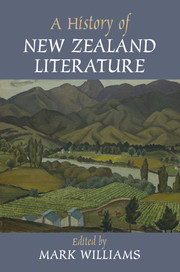Book contents
- Frontmatter
- Contents
- Notes on Contributors
- Acknowledgments
- Introduction
- PART I 1760–1920
- PART II 1920–1950
- PART III 1950–1972
- PART IV 1972–1990
- PART V 1990–2014
- 20 ‘While History Happens Elsewhere’: Fiction and Political Quietism, 1990–2014
- 21 Anecdote in Post-1990 New Zealand Poetry
- 22 From Exploring Identity to Facing the World: Drama Since 1990
- 23 From Meadow to Paddock: Children's and Young Adult Literature
- 24 ‘Nafanua and the New World’: Pasifika's Writing of Niu Zealand
- 25 New Zealand Literature in the Program Era, or, the Spirit of Nationalism Past
- Index
22 - From Exploring Identity to Facing the World: Drama Since 1990
from PART V - 1990–2014
Published online by Cambridge University Press: 05 April 2016
- Frontmatter
- Contents
- Notes on Contributors
- Acknowledgments
- Introduction
- PART I 1760–1920
- PART II 1920–1950
- PART III 1950–1972
- PART IV 1972–1990
- PART V 1990–2014
- 20 ‘While History Happens Elsewhere’: Fiction and Political Quietism, 1990–2014
- 21 Anecdote in Post-1990 New Zealand Poetry
- 22 From Exploring Identity to Facing the World: Drama Since 1990
- 23 From Meadow to Paddock: Children's and Young Adult Literature
- 24 ‘Nafanua and the New World’: Pasifika's Writing of Niu Zealand
- 25 New Zealand Literature in the Program Era, or, the Spirit of Nationalism Past
- Index
Summary
In Roger Hall's Bookends (2014), playwright Phil Anderson observes that ‘a New Zealand novel sells a couple of thousand’ and ‘it gets in the best seller list’, while a play by ‘say, Dave Armstrong, sells many times that number of seats … and the literati turn up their noses’. Homegrown drama may be something of a poor relation in the development of New Zealand literature; however, as Murray Edmond points out, ‘the past thirty years of playwriting practice in Aotearoa-New Zealand represent the strongest literary contribution of that period’. This is because the stage has proved an especially productive site for exploring the myriad, compelling issues of identity that have come to dominate cultural and political discourse in Aotearoa-New Zealand. As Charles Taylor observes, we discover and negotiate our identity ‘through dialogue … with others’, and theatre has provided an ideal arena for such dialogue.
In the context of the debates around biculturalism and multiculturalism, Māori and, more recently, Pacific Island and Asian theatre-makers, have been prominent in invigorating Indigenous drama and theatre in the last twenty-five years. While their initiatives have tended to focus on race and culture, they have been part of a continuing, wider attention to national identity and history, sometimes in conjunction with issues of gender and sexuality. In exploring this terrain, playwrights and theatre-makers have experimented with an increasingly diverse, sophisticated repertoire of dramatic and theatrical forms and strategies that have moved emphatically beyond the ‘mundane’, naturalistic modes of representation, which, for David Carnegie, too commonly characterised New Zealand drama in the past. Definitions of drama have also broadened to include documentary/verbatim theatre and auto-ethnographic theatre, and, in line with international practice, there has been a growing emphasis on the physical and visual over the verbal, particularly in collectively created theatre, which has become more prominent in mainstream theatre. This chapter traces the principal recent developments in New Zealand drama: the burgeoning of Māori theatre in the 1990s; the corresponding focus on aspects of Pākehā (European) identity in the context of a broader exploration of local history and culture; and the emergence of Asian theatre alongside Pacific theatre. It ends by acknowledging the persuasive case for that drama to shed some of its insularity and (re)adopt a broader political and international perspective.
- Type
- Chapter
- Information
- A History of New Zealand Literature , pp. 330 - 346Publisher: Cambridge University PressPrint publication year: 2016



